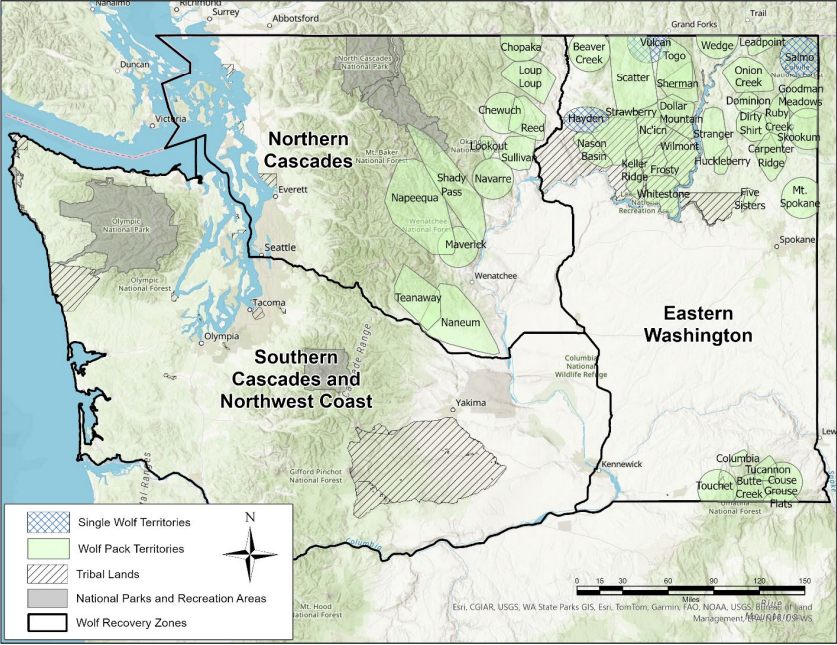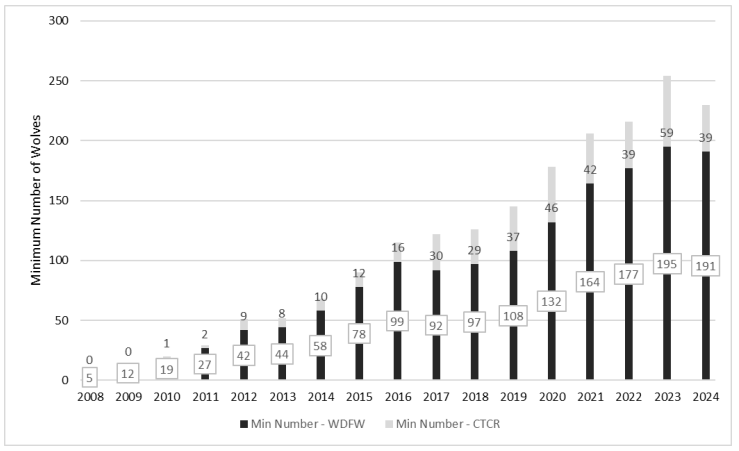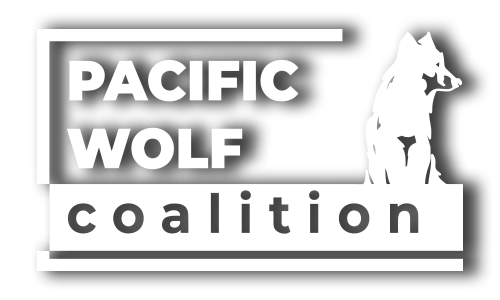Washington state is currently home to 43 known gray wolf packs with a minimum count of 230 wolves statewide.

Since 2021, the Washington Department of Fish and Wildlife (WDFW) has collaborated with the Confederated Tribes of the Colville Reservation (CTCR) and the Spokane Tribe of Indians to report an annual wolf count that includes wolves in the lands managed by the tribal wildlife agency.
Definition of a wolf pack in Washington
Under the state’s Wolf Conservation and Management Plan, a wolf pack is defined as two or more wolves traveling together in winter. A successful breeding pair is defined as an adult male and female with at least two pups that survive until the end of the year. The adults do not have to be the parents of surviving pups.
Recovery
Gray wolves are native to Washington state. Wolves were almost entirely extirpated from the state by the 1930s due to hunting, trapping, poisoning, and bounty programs. In the 1990s, federal and tribal biologists reintroduced native gray wolves from Canada into Yellowstone National Park and central Idaho. Descendants of these wolves, as well as wolves from British Columbia in Canada, have since naturally dispersed back into Washington. In 2008, state wildlife managers documented the first breeding pack in almost 80 years, the Lookout Pack.
Washington’s wolf recovery is a result of natural recolonization. Gray wolves were not released into the state by biologists, but arrived here by natural migration from Idaho and British Columbia, Canada. 2024’s year-end minimum wolf count showed a population decrease for the first time in 16 years, with a 9% population decrease and a 25% plummet in breeding pairs.

Protected Status
Gray wolves are protected statewide by the Washington Endangered Species Act. The WDFW manages wolves as an endangered species across the state according to state law; however, wolves were temporarily removed from federal Endangered Species Act (ESA) protections, or “delisted,” in January 2021, leaving wolf management to states. Federal ESA protections are generally more robust than state ESA protections. A judge reversed this delisting in 2022, reinstating federal protections except for the “Northern Rocky Mountain distinct population segment.”
This range of wolves, which spans Montana, Idaho, Wyoming, and parts of Washington, Oregon, and Utah, is considered a “distinct population segment,” as designated by the US Fish and Wildlife Service in 2008, with a final ruling in 2009. In 2011, Congress pushed through a rider bill that delisted wolves in this area from the ESA. This was the first and only time Congress removed a species from the ESA, and the rider included a provision that the rule “shall not be subject to judicial review.” Therefore, wolves in this population segment remain federally delisted and managed only by state governments.
Wolves in Eastern Washington are considered part of this population segment and are therefore not federally protected. Luckily, they remain protected and managed by the Washington Endangered Species Act.
In the state of Washington, wolf recovery efforts are guided by the Wolf Conservation and Management Plan, which was adopted by WDFW in 2011.
Wolf Packs
Northern Cascades
Chewuch Pack
Chopaka Pack
Lookout Pack
Loup Loup Pack
Maverick Pack
Naneum Pack
Napeequa Pack
Navarre Pack
Reed Mountain Pack
Shady Pass Pack
Sullivan Creek Pack
Teanaway Pack
Eastern Washington
Beaver Creek Pack
Butte Creek Pack
Carpenter Ridge Pack
Columbia Pack
Couse Pack
Dirty Shirt Pack
Dollar Mountain Pack
Dominion Pack
Five Sisters Pack
Frosty Pack
Goodman Meadows Pack
Grouse Flats Pack
Huckleberry Pack
Keller Ridge Pack
Leadpoint Pack
Mt. Spokane Pack
Nason Basin Pack
Nc’icn Pack
Onion Creek Pack
Ruby Creek Pack
Scatter Pack
Sherman Pack
Skookum Pack
Stranger Pack
Strawberry Pack
Togo Pack
Touchet Pack
Tucannon Pack
Wedge Pack
Whitestone Pack
Wilmont Pack
Wolf Packs that are no longer active
Big Muddy Pack
Diamond Pack – dispersed to Idaho
Diobsud Creek Pack
Kettle Pack
OPT – Old Profanity Territory Pack
Profanity Peak Pack
Salmo Pack
Smackout Pack
Vulcan Pack
Wenatchee Pack


